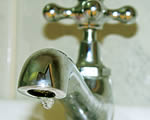 Go to main content
Go to main content
Archive Website of the UK government
Please note that this website has a UK government accesskeys system.
Main menu
Page menu
Home and community

Dealing with drinking water problems

Drinking water in England and Wales is of a very high quality. However, on rare occasions things may go wrong. Find out how the quality of water is maintained and what to do if you are worried.
How to report problems with your water supply
Your drinking water should be clear and bright. If it looks cloudy or discoloured or tastes or smells different, you should contact:
- your water company, if you are supplied by one
- the environmental health department of your local council if you have a private supply (usually a private well, borehole or spring supply)
To find contact details for your water company, look on your water bill or check online. You can also find enquiry and emergency numbers listed under 'water' in your telephone directory.
Causes of changes in your drinking water
Any one of the following could cause a change in the smell or taste of your drinking water:
- the use of chlorine as a disinfectant
- seasonal changes
- a change in your water supply
- moving from one area to another
- your plumbing
Chlorine, smell or taste
Chlorine is a very effective disinfectant which has been used to treat drinking water for over 100 years. It is harmless when used in very small amounts, and is commonly used in various brands of sterilisers for baby feeding bottles and equipment.
A small amount of chlorine is needed to keep drinking water safe. This may result in a slight chlorine taste or smell in your drinking water.
Discoloured water
Burst mains or increases in demand can cause small amounts of mains deposits to be disturbed and enter the water supply. This may change the colour of your drinking water. While these deposits are normally harmless, it should be reported to your water company.
Lead
Lead isn’t usually present in the public water supply. However, if your home was built before 1970, it’s possible some of your pipes and plumbing may be made from lead.
In hard water areas, the scale that forms on the inside of pipes protects against lead dissolving from the pipes into the water. In soft water areas, there’s a greater likelihood of lead from pipes being present in the water. Where this risk exists, water companies treat the water to reduce the problem significantly.
A less common cause of lead in drinking water is the illegal use of lead solder to join together sections of drinking water pipes. This can sometimes mistakenly be done by unqualified plumbers or householders.
You may be able to tell if you have lead pipes by examining the pipework connected to your internal stop tap. This is usually located under the kitchen sink. Lead pipes are dark grey (under any paint) and are soft and easily marked.
If you suspect your home has lead pipes, you can ask your water company to test the water at your kitchen tap for lead.
Fluoride
In England, the decision to fluoridate your water supply is made by your local health authority. When deciding whether to fluoridate, a local health authority must carry out a public consultation exercise. The findings of the public consultation must be taken into consideration before they reach a final decision.
The law only permits a water company to fluoridate under instruction from a local health authority. If instructed to fluoridate the water supply, a water company must stick to a strict code of practice to keep consumers safe.
Pesticides and nitrates
Rivers and ground waters may contain traces of pesticides. This can be a result of agricultural use (pest control on crops) and non-agricultural use (herbicide for weed control on highways and railways). Water companies treat water for drinking to ensure it meets water quality standards.
You can find further information on all the above issues on the Drinking Water Inspectorate website.
How to complain about your water company
If you have a complaint about your water company, you should contact the water company in the first instance.
If that doesn’t resolve the problem, you can contact any of the following:
- your local Consumer Council for Water
- the Drinking Water Inspectorate for drinking water quality concerns
You can find out about your area's water quality by asking your water company for a summary of all test results in your area. You are entitled to a free copy of the record for the area where you live.
 Facebook
Facebook Twitter
Twitter StumbleUpon
StumbleUpon Delicious
Delicious Reddit
Reddit
